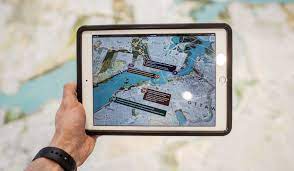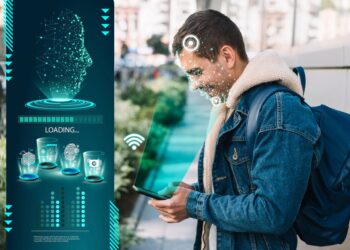Augmented Reality for Tourism: Enhancing Travel Experience
Augmented Reality (AR) is transforming the tourism industry by providing immersive and interactive experiences that enhance the travel experience. AR allows tourists to explore destinations in a new way, learn about historical and cultural sites, and interact with digital content in real-time. In this article, we explore how AR is enhancing the travel experience and changing the way we explore destinations.
AR in Destination Exploration
AR is changing the way tourists explore and navigate destinations. AR-powered mobile apps can provide real-time information about nearby attractions, restaurants, and other points of interest. AR can also be used to provide virtual tours of destinations, allowing tourists to explore sites and landmarks from the comfort of their hotel room or home.
AR in Historical and Cultural Sites
AR is also being used to enhance the experience of visiting historical and cultural sites. AR can bring historical sites to life by providing virtual reconstructions of ancient buildings and monuments, allowing tourists to experience what they looked like in their prime. AR can also be used to provide interactive experiences, such as virtual treasure hunts and quizzes, that teach tourists about the history and significance of different sites and landmarks.
AR in Museums and Galleries
AR is transforming the museum and gallery experience by providing interactive and immersive experiences that engage visitors and provide additional information about exhibits. AR can be used to provide virtual tours of exhibits, allowing visitors to explore exhibits in a new way. AR can also be used to provide additional information about exhibits, such as explanations of historical context or information about the artists.

The Benefits of AR in Tourism
Enhanced Experience: AR provides an immersive and interactive experience that enhances the travel experience for tourists.
Personalization: AR allows tourists to personalize their travel experience by exploring destinations and sites in a way that suits their preferences.
Education: AR can be used to provide educational experiences that teach tourists about the history and cultural significance of different sites and landmarks.
Marketing: AR can be used as a marketing tool to promote destinations and attract tourists.
Innovation: AR allows tourism businesses to differentiate themselves from their competitors by providing innovative and unique experiences.
The Challenges of AR in Tourism
Technical Complexity: AR requires specialized technical expertise, which can be difficult for some tourism businesses to acquire.
Integration: AR requires integration with existing systems and processes, which can be challenging for some tourism businesses.
Adoption: AR requires investment in new technology and processes, which may be a barrier to adoption for some tourism businesses.
Cost: AR can be expensive to implement and maintain, particularly for small businesses.
Privacy: AR can raise privacy concerns, particularly if it involves collecting and using personal data.
How to Successfully Leverage AR in Tourism
To successfully leverage AR in tourism, businesses should take the following steps:
Focus on the User Experience: AR should be used to enhance the user experience and provide personalized experiences for tourists.
Invest in Technical Expertise: Businesses should invest in technical expertise and resources to successfully implement and manage AR systems.
Ensure Integration: Businesses should ensure that AR systems are integrated with existing systems and processes to ensure that they can be used effectively.
Address Privacy Concerns: Businesses should be transparent about how they are using AR and how they are protecting user data.
Collaborate with Industry Partners: Businesses should collaborate with industry partners to share best practices and develop industry-wide standards for the use of AR in tourism.
Conclusion
AR is transforming the tourism industry by providing immersive and interactive experiences that enhance the travel experience for tourists. While it presents both opportunities and challenges, it is clear that AR will play an increasingly important role in the tourism industry. By focusing on the user experience, investing in technical expertise, ensuring integration, addressing privacy concerns, and collaborating with industry partners, tourism businesses can successfully leverage AR to provide innovative and impactful services to their customers.

Looking ahead, it is likely that we will see the development of new AR applications and use cases in the tourism industry. For example, we may see the development of AR-powered virtual assistants that provide personalized recommendations and assistance to tourists, such as suggesting restaurants and activities based on their preferences and location.
Additionally, we may see the development of AR-powered virtual reality experiences that allow tourists to explore destinations and landmarks in a more immersive way. For example, tourists could use AR-powered goggles to explore the Great Wall of China or Machu Picchu in a virtual reality experience.
As these new AR applications and use cases are developed, it will be important for tourism businesses to continue to prioritize the user experience, invest in technical expertise, ensure integration, address privacy concerns, and collaborate with industry partners.
AR presents both opportunities and challenges in the tourism industry. While it has the potential to transform the industry by enhancing the user experience, providing personalized experiences, and promoting destinations, it also presents challenges related to technical complexity, integration, adoption, cost, and privacy. By successfully leveraging AR while managing the challenges, tourism businesses can stay ahead of the curve and provide innovative and impactful services to their customers.
Moreover, AR is not limited to the tourism industry alone. AR can be used in other industries such as retail, education, healthcare, and more to enhance the user experience and provide personalized experiences.
For example, in retail, AR can be used to create virtual try-on experiences that allow customers to see how products would look on them before making a purchase. In education, AR can be used to provide interactive and immersive learning experiences that engage students and enhance their understanding of complex topics.
As AR technology continues to evolve and become more sophisticated, we can expect to see the development of new AR applications and use cases in various industries, providing innovative and impactful experiences to users.
AR is a transformative technology that has the potential to enhance the user experience in various industries, including tourism. By focusing on the user experience, investing in technical expertise, ensuring integration, addressing privacy concerns, and collaborating with industry partners, businesses can successfully leverage AR to provide innovative and impactful services to their customers. As AR technology continues to evolve and become more sophisticated, we can expect to see new and innovative AR applications and use cases, providing new opportunities for businesses to enhance the user experience and stay ahead of the curve.





















